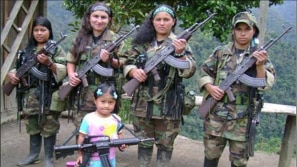Santos tries again against recent popular vote 
Bogota, Nov.19.─ When on October 2nd a narrow majority of Colombian voters rejected a peace agreement under which the FARC guerrillas were to disarm, it was not just a pollster-confounding shock. It was also a rebuke to the government of Juan Manuel Santos, to negotiators who spent four tough years working on the accord and to the international establishment, which had praised the accord. Thus stung, Mr Santos’s people and the FARC’s leaders went back to the table. On November 12th they came up with a revised agreement. Will it command wider public support?
According to Mr Santos, the result is a “renovated, adjusted, more precise and clarified” accord that takes account of many of the objections of the critics, led by Álvaro Uribe, his predecessor and now his chief foe. It is even longer—310 pages instead of 297—but its essence remains the same. The FARC will disarm and become a civilian political party. FARC leaders found guilty of war crimes will not be sent to jail; instead, they will face alternative penalties involving “effective restrictions of liberty”, provided they confess their deeds before a special tribunal.
The new agreement tidies up loose ends, and involves a few significant concessions from the FARC. Their new political party will get less public money. The tribunal will now be composed only of Colombian judges, with foreign magistrates reduced to the status of observers. The time limit for implementing the agreement has been extended from ten to 15 years, to lessen the fiscal strain caused by spending billions of dollars on rural development. Importantly, only the provisions regarding international humanitarian law, and not the whole agreement, will be written into Colombia’s constitution. That would have made the constitution unwieldy, and risked making policy choices, such as land reform, irrevocable.
Many of the other changes spell out matters implied in the original accord. For example, the tribunal will define the place to which convicted FARC leaders will be confined, and this will be not much bigger than a village. The tribunal’s decisions will be subject to review by Colombia’s constitutional court. The FARC must declare their assets, and the details of their involvement in drug-trafficking—something prosecutors were likely to winkle out of them anyway. Land reform will not affect the right to private property. The government can use aerial spraying of coca crops if manual eradication fails. Another raft of changes, aimed at mollifying the churches, removes much of the original politically correct language concerning “gender equity” and the rights of gays and transsexuals.
The FARC may have accepted such changes because they have at last understood that most Colombians abhor them ...
[ Full text ]
Comments powered by CComment